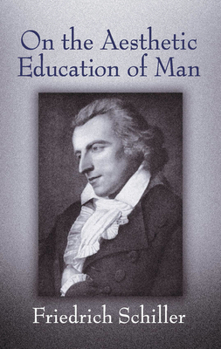On the Aesthetic Education of Man
Select Format
Select Condition 
Book Overview
"Essential reading." -- New Society.
A classic of eighteenth-century thought, Friedrich Schiller's treatise on the role of art in society ranks among German philosophy's most profound works. In addition to its importance to the history of ideas, this 1795 essay remains relevant to our own time.
Beginning with a political analysis of contemporary society -- in particular, the French Revolution and its failure to implement universal freedom...
Format:Paperback
Language:English
ISBN:0486437396
ISBN13:9780486437392
Release Date:September 2004
Publisher:Dover Publications
Length:146 Pages
Weight:0.42 lbs.
Dimensions:0.3" x 5.6" x 8.5"
Customer Reviews
2 ratings
A Classic!
Published by Thriftbooks.com User , 15 years ago
Ok here's a little pop culture bit to sweeten the mighty load of Friedrich Schiller: The intellectuals of this period, inspired and defined by Goethe's seminal teen-angst classic The Sorrows of Young Werther. Werther's style is still seen today in the goth subculture- moopy, depressed, poetic, etc. Basically that's a combination of Anglo Byronic romanticism and German romanticism. One of the main symbols of the Werther/Schiller era of German Romanticism is the blue flower of Novalis. (Wiki) I see Schiller as being the actual embodiment of the Werther character, particularly after finishing the Aesthetic Educations of Man, a book I've now read three different times (undergraduate, law school, last month.) That's probably because I see this book as kind of the birth of Romantic Pop Culture. Basically, Schiller took Kantian idealism and crossed it with a popular format (i.e. they're written as "letters") Unlike Kant, you can actually read Schiller, since this book is only 140 pages long. The reason this book is still relevant is that Kantian idealism underlays most popular manifestations of Romanticism, but most people who consider themselves "Romantics" literally have no idea what Kantian idealism means. Myself included. Thus, by reading this one 140 page book, you can kind of get a handle on the relationship, and gain a better understanding of artists who are influenced by this time period. Like Depeche Mode... or, for a more hipster specific reference, Dr. Octagon's classic Blue Flowers. Cue lyrics: Look at the land... Blue Flowers! Drawing by the purple pond, in the purple pastures Blue Flowers! Drawing by the purple pond, yellow ink that flows Blue Flowers Romanticism runs strong and deep in all of the Western nations. It is, in fact, the primary ideology for people dissatisfied with reality Just think about the prevalence of the "lonely hero." It's also the primary posture of artists of all stripes. The more "popular" the art, the more romantic it is likely to be. Romanticism is both current and 400+ years old. Thus, contemporary artists can manipulate the audience by being more aware of the symbols and modes of thought of something like Romanticism, since the listener WILL respond: Think of all the people wearing Depeche Mode T-Shirts with Blue Flowers and Tour Dates printed on the back. That's pure, unadulterated, 18th century German Romanticism. The modern artist is inevitably an interpreter/re-interpreter of symbols with long-standing cultural resonance.
Excellent edition of an excellent work.
Published by Thriftbooks.com User , 18 years ago
Writing in the 1790s, Schiller united the rigorous epistemology of Kant and Fichte with Plato's dynamic account of the development of the soul to produce one of the most beautiful works of philosophy in the European tradition. The Letters on Aesthetic Education offer an interpretation of the development of the individual and the parallel development of Western civilization. These interpretations focus on the conditions that allow for mental health in a human individual and society, and especially demonstrate (as the title indicates) the crucial role of artistic experience in healthy human development. This is a great work, and a great introduction to the other German philosophers of the 19th Century (Hegel, Schopenhauer, Nietzsche, et al). This edition is very good: the translation is good, and it has a facing German text. Highly recommended.





